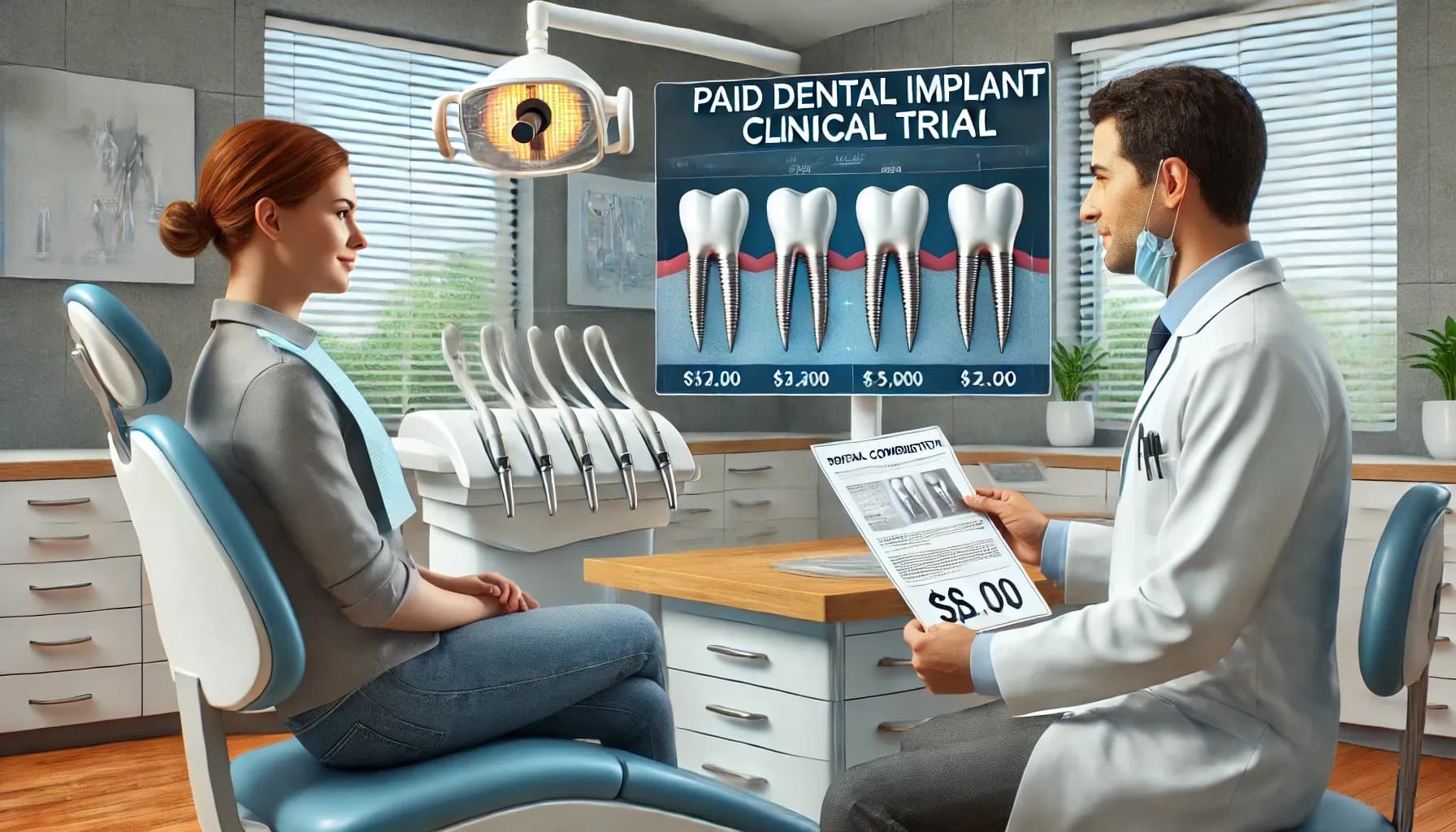How You Can Earn 4 Figures by Participating in Paid Dental Implant Clinical Trials
If you’ve been considering dental implants, there’s an opportunity to benefit from cutting-edge research while earning significant compensation. Participating in paid dental implant clinical trials can help you access new treatment options, improve oral health, and potentially earn up to four figures in compensation.

Here’s everything you need to know about these trials, how they work, and what you can expect in terms of payment.
What Are Dental Implant Clinical Trials?
Dental implant clinical trials are research studies designed to evaluate the effectiveness, safety, and long-term success of new dental implant materials, procedures, or technologies. Researchers often conduct these trials to test new implants, surgical techniques, or bone graft materials before they become widely available to the public.
By participating in these trials, patients can access state-of-the-art dental care that may not be offered elsewhere, while helping to advance dental research and improve treatment outcomes for future patients.
Why Participate in a Dental Implant Clinical Trial?
There are several compelling reasons to consider joining a dental implant clinical trial:
Access to Innovative Treatments: Clinical trials often provide participants with new and advanced dental implant options that are still being tested. These implants might offer better longevity, appearance, or comfort compared to existing treatments.
Reduced or No-Cost Dental Implants: Many trials cover the cost of the dental implant procedure entirely, significantly reducing or even eliminating out-of-pocket expenses for participants.
Expert Care: Clinical trials are typically conducted by highly trained dental professionals and researchers who specialize in implantology, ensuring participants receive top-quality care.
Financial Compensation: In addition to receiving free or low-cost dental implants, many trials offer substantial financial compensation. In some cases, participants can earn up to four figures for their involvement, depending on the trial’s requirements.
How Much Can You Earn?
Compensation for dental implant clinical trials varies depending on factors such as the complexity of the study, the number of visits required, and the length of the trial. However, it’s not uncommon for participants to earn between $1,000 and $4,000 for completing a dental implant clinical trial.
The specific amount you can earn depends on:
Duration of the Trial: Longer trials or those involving follow-up appointments over an extended period often offer higher compensation.
Complexity of Procedures: Trials that involve more extensive or invasive procedures, such as multiple implants or bone grafting, may offer more significant payment.
Location of the Study: The compensation amount can vary based on geographic location and the local cost of living.
In addition to financial compensation, participants may also receive a free or discounted dental implant, which can save them thousands of dollars.
What to Expect During a Dental Implant Clinical Trial
Participating in a dental implant clinical trial typically follows a structured process to ensure patient safety and study integrity. Here’s a general overview of what you can expect:
Screening and Eligibility: Before joining a trial, you’ll undergo a thorough screening process to determine if you’re a suitable candidate. This screening often involves dental exams, X-rays, and reviewing your medical history.
Informed Consent: If you’re eligible, the researchers will provide detailed information about the trial, including its purpose, procedures, potential risks, and benefits. This is your opportunity to ask questions and ensure you fully understand the study before agreeing to participate.
Dental Implant Procedure: The trial may involve receiving one or more dental implants, testing a new type of implant, or using a novel surgical technique. The implant procedure itself is typically similar to standard implant surgery, but with added monitoring and data collection for research purposes.
Follow-Up Visits: Most clinical trials require participants to return for follow-up appointments to monitor the success of the implants, assess healing, and evaluate any side effects. These visits are crucial for gathering data and ensuring the safety of the new treatment.
Compensation: Payment is usually provided at specific milestones, such as after completing the procedure, follow-up visits, or at the end of the trial. Ensure you understand the payment schedule before enrolling.
Finding Dental Implant Clinical Trials
If you’re interested in participating in a paid dental implant clinical trial, there are several ways to find available studies:
ClinicalTrials.gov: This comprehensive database lists ongoing clinical trials, including those related to dental implants. You can search for trials based on location, type of implant, or other criteria.
Dental Schools and Research Institutions: Many dental schools and research centers conduct clinical trials on dental implants. Contact nearby institutions to inquire about ongoing or upcoming trials.
Dental Implant Manufacturers: Implant manufacturers often sponsor clinical trials to test new products. You can check their websites or contact them directly for information on any studies they are conducting.
Things to Consider Before Participating
While the opportunity to earn four figures and receive dental implants at little or no cost is appealing, it’s essential to carefully consider the following before joining a clinical trial:
Risks and Side Effects: As with any surgical procedure, dental implant trials come with risks. Be sure to ask about any potential complications or side effects associated with the new implant or procedure.
Time Commitment: Clinical trials often require multiple visits over an extended period. Ensure that you can commit to the required appointments and follow-up visits.
Eligibility Requirements: Not everyone will qualify for dental implant clinical trials, as eligibility criteria can be strict. Be prepared to undergo a thorough screening process.

